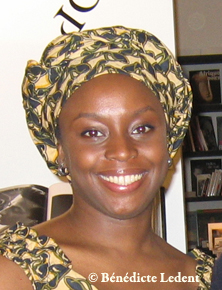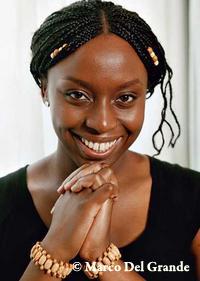Question: Critics tend to categorize you as either a Nigerian author, a feminist or even an African-American writer. Do you feel that such generalizations might be reductive or do you see categorization as something positive in the sense that your being the “new voice of Nigerian literature”, for example, might inspire younger Nigerian writers to follow in your footsteps?
 Chimamanda Ngozi Adichie: Generalizations are always reductive, I think, because they shrink you from a whole to a mere part. I am Nigerian, feminist, Black, Igbo, and more, but when I am categorized as one, it makes it almost impossible to be seen as all of the others, and I find this limiting.
Chimamanda Ngozi Adichie: Generalizations are always reductive, I think, because they shrink you from a whole to a mere part. I am Nigerian, feminist, Black, Igbo, and more, but when I am categorized as one, it makes it almost impossible to be seen as all of the others, and I find this limiting.
I used to insist that I was simply a writer, that I rejected tags before ‘writer,’ especially tags based on race like ‘black’ or ‘African,’ because they are not value-free. They come with baggage. For example, a black writer who wrote about Africa would be placed on the ‘ethnic’ shelf in many bookstores in the US and UK, ‘ethnic’ in this sense subtly suggests not being quite on a par with ‘mainstream’ writing. A white writer, such as the Polish Ryszard Kapuscinski would not be on that ‘ethnic’ shelf. He would be considered ‘mainstream’ although he would be writing on the same subject as the black writer. The point is that it would be preferable if categorizations were based on the writing rather than on the writer.
Yet, we cannot deny that there are strong linkages based on race or gender or nationality. Being part of an under-represented group brings with it a sense of ‘we-ness’ which is why I feel an odd pride when an Igbo or an African or African-American or woman or Nigerian does well. I suppose categorization can be positive in this way. My being seen as a ‘Nigerian writer’ could motivate other Nigerian writers, in a way that my just being a ‘writer’ would not.
The more I think about just being a ‘writer,’ the more I realize that it is a position that is too easy to take. It would work only in a happily homogenized fantasy world. I cannot be just a ‘writer’ all the time; there are situations in which I will simply have to accept some tag before it. We all carry different labels and they come into play in what we write and in how we are read. The sad thing is that critics and sometimes readers do not hold all labels in equal significance.
I am less resentful of categorizations. I accept, sometimes even celebrate, them but I still feel much ambivalence about them. I am also wary of the baggage that comes with them and of having somebody else be prescriptive about them.
Q: Do you think that, as a writer, you have a political role to play?
CNA: I don’t think that all writers should have political roles, but I do think that I, as a person who writes realist fiction set in Africa, almost automatically have a political role. In a place of scarce resources made scarcer by artificial means, life is always political. In writing about that life, you assume a political role.
Q: How important is language and style in your work? Do you view the Igbo language as a major influence on your fiction?
CNA: Igbo is a major influence since most of my characters speak it and since I mutter in Igbo when the writing is not going well.
Language and style are very important to me; I am a keen admirer of good prose stylists and I can tell, right away, which writers pay attention to style. I care about the rhythm of a sentence. I care about word choice. I much respect poetic prose done well.
Q: In several interviews you have mentioned Chinua Achebe as one of your favourite novelists. Could you tell us about your other literary influences? How have other works (or people) affected your writing?
CNA: I really don’t know. I am sometimes suspicious of the ‘literary influences’ question. It makes me wonder if it really means – tell us who you are trying to imitate. It also makes me wonder if the person asking is trying to ‘place’ you somewhere as a writer. Chinua Achebe will always be important to me because his work influenced not so much my style as my writing philosophy: reading him emboldened me, gave me permission to write about the things I knew well.
I am influenced by everything I read, I suppose. I read bad fiction and it influences me in such a way that I know what never to do. I read good fiction and it makes things flow for me, as it were. I generally prefer quiet, careful writing, story and style done well, literature that makes you think of that interesting word ‘art.’ One of my favourite novels is ‘Reef’ by Romesh Gunesekera. Some writers I have recently reread and will probably read again are Paule Marshall, Amit Chaudhuri, John Banville, Nawal El-Saadawi, Graham Greene, Flora Nwapa, Bernard Malamud, Ivan Turgenev and the incredibly talented John Gregory Brown.
So many people have affected my writing; for everyone I meet and/or talk to, there is the possibility of my fiction being influenced. Of my contemporaries, perhaps the greatest influence is my friend the Kenyan writer Binyavanga Wainaina. I am in awe of his brilliance. Although we often disagree, I think our ideas take better shape when bounced back and forth between each other.
Q: In the late 1980s, Ben Okri said this about the Nigerian Civil War: “That is one nightmare we have not really faced; any society, anywhere, any individual that doesn’t face their nightmares, the nightmares of their truths, their conditions, they diminish, because their nightmares get bigger.” Since you have written on the Biafran War, is this a statement you can relate to?
CNA: Yes. I don’t think that we Nigerians have faced the realities of the war. I think it is a part of our history that we are so afraid of that we cloak it in silence or in cliché.
 Q: Your first novel, Purple Hibiscus, has been extremely well received by readers of all ages, genders and countries. Do you feel that this success can be specifically attributed to the form or theme of the book, or both?
Q: Your first novel, Purple Hibiscus, has been extremely well received by readers of all ages, genders and countries. Do you feel that this success can be specifically attributed to the form or theme of the book, or both?
CNA: And perhaps to luck as well? Really, I don’t know why PURPLE HIBISCUS has done relatively well. (I hoped for success but was prepared for indifference since so many agents, in rejecting the manuscript, had told me that nobody cared about Nigeria). I like to think that both form and theme have contributed. It is a book I am very pleased with, and I would write it again if I had to do a first novel all over again. I like to think, too, that it is a book that you finish reading because you want to rather than because you ought to.
Q: Eugene has often – rightly I think – been described as a complex character. But it seems to me that Kambili too, despite her silence, is divided between a devotional love for her father and an urge to question his values, especially as the novel advances. Am I right in thinking so?
CNA: Yes. I hoped that Kambili would be read like that. She does learn to question him, but many of her questions are silenced by fear and love and routine.
Interview by Daria Tunca. Posted 27 January 2005.
© 2005 Chimamanda Ngozi Adichie & Daria Tunca. Please do not reproduce without permission.

|
Page hosted by the University of Liège
|

|

